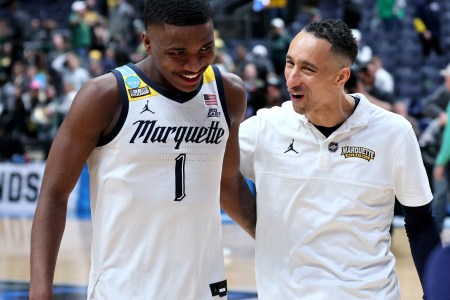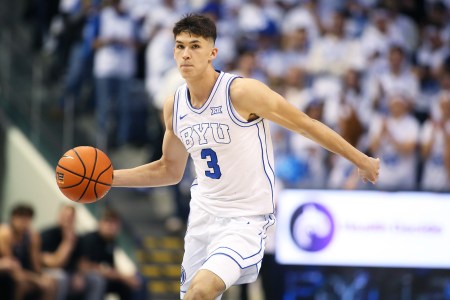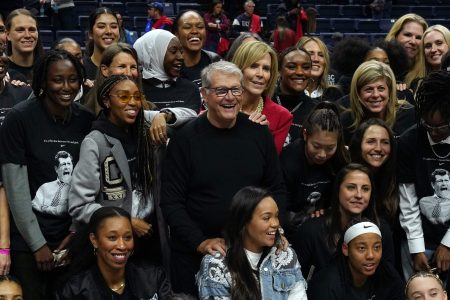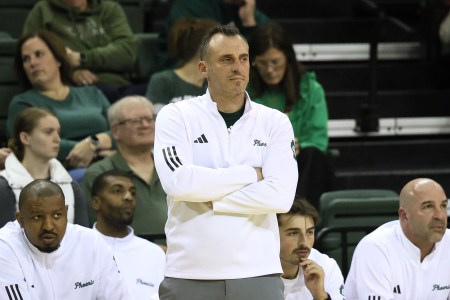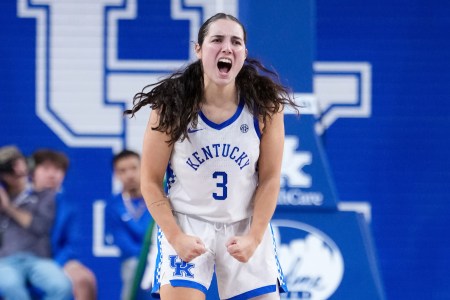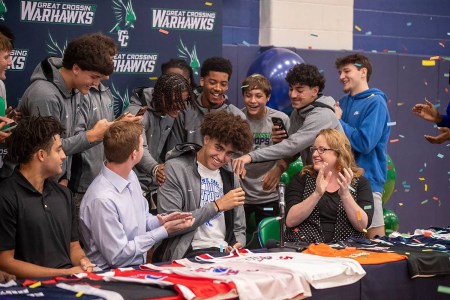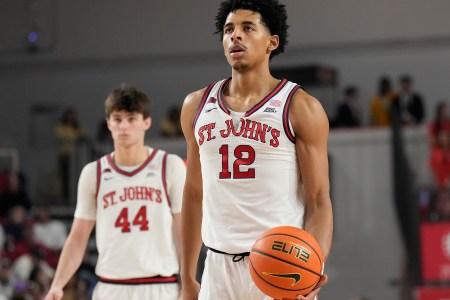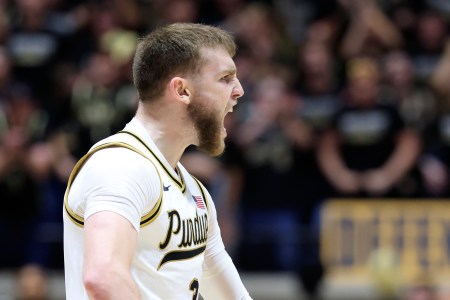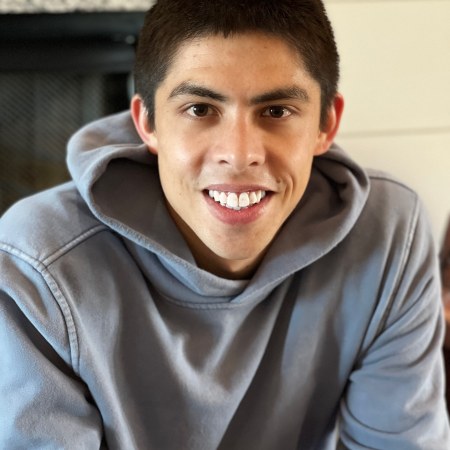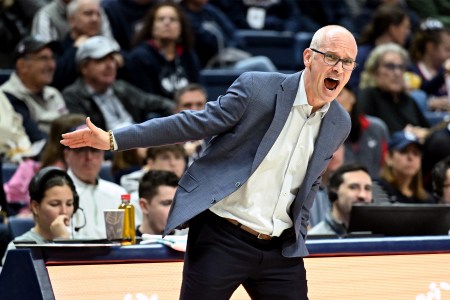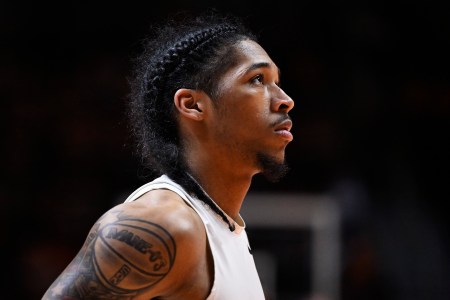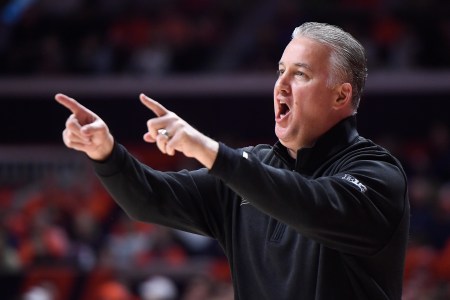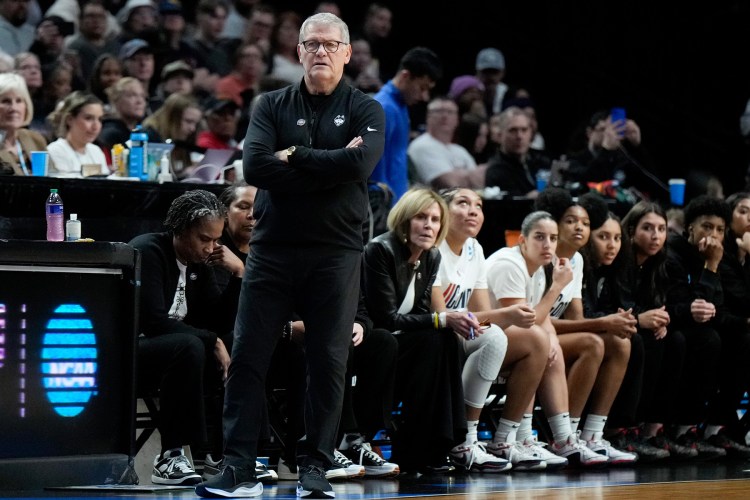5:41 A.M.
Rick Pitino is early. About four minutes early, to be exact. I am waiting for him outside the Equinox in Mamaroneck, New York. The sky is dark. The streets are empty. A light rain is falling.
We shake hands and say hello, and then he swiftly enters the gym, moving as if he is running late. I get stopped at the front desk to sign a guest waiver, and by the time I am checked in — no more than two minutes later — Pitino is already on the elliptical machine. And he is pushing it.
I hop on a treadmill, figuring this is just a warm-up. I am mistaken. Pitino does 45 minutes of cardio at the same brisk pace, covering more than six miles. He is 72 years old and I am 29, but already I am having a hard time keeping up. A compilation of the top hits from four different decades — the 70s, 80s, 90s and 00s — plays in his AirPods. Pitino loves music, and this mix, he tells me, is one of his favorites. Billy Joel and Journey to Beyoncé and DMX.
After climbing off the elliptical, Pitino speeds through four different chest and tricep workouts, including the bench press (he lifts 135 pounds with ease), in the span of 10 minutes. It is probably best that I don’t tag in. The day is (very) young, and I need to conserve energy.
Hoops HQ has sent me to follow Pitino for the full day. When my alarm sounded at 4:30 a.m., I couldn’t even muster the strength to hit the snooze button. I have somehow made it through Phase One, but there’s a lot more on the agenda.
As I am about to discover, Pitino approaches every day as if it is the most important day of his life. “After we won the 2013 championship, I wrote a book called One Day Contract,” he later tells me. “I really wrote it for myself. It’s about if you have one day to be judged as a person, as a coach, as a mentor, how good would you be in terms of signing a new contract? I try to live by that because [that’s how] you get the most out of every day.”
Five decades into his legendary career, Pitino is still earning a new contract every day. And this one is just beginning.
6:45 A.M.
It is still dark outside when we leave Equinox. I tell Pitino that I can’t remember the last time I worked out before the sun came up. “It feels great, doesn’t it?” he says.
Pitino goes to the gym every morning to maintain his stamina. It is a long and taxing college basketball season, and without these workouts, he doesn’t think he would be able to continue coaching. The training fuels him.
We drive over to Pitino’s house to pick up his dog, an adorable mini goldendoodle named Gigi, then head to Saxon Woods Park. There is a beautiful trail that Pitino and Gigi like to stroll — along with Pitino’s friend Ron and his golden retriever Layla — if the weather permits. Blanketed by fall leaves, the path snakes through the woods, passing by the Mamaroneck Reservoir. It is quiet and peaceful, especially at this hour.
Pitino leaves his phone in the car. The walk is a chance to just enjoy the outdoors and the company of others, distraction free. We take “the short way,” according to Pitino, though it doesn’t feel short to me. It winds for about two miles, eventually leading us back to where we started. In the parking lot, I check my steps for the day; it isn’t yet 8:00 a.m., and I’ve already walked more than I did yesterday.
Pitino eyes the time on his car’s dash and realizes we’re a bit behind schedule. He calls his wife Joanne and asks her to throw some of his clothes in a bag. The plan is to swing by the house, drop off Gigi, grab the bag and go, go, go.
7:55 A.M.
No traffic on the route to St. John’s, according to the GPS. Phew. We even have time to pick up Starbucks on the way. Pitino places the order beforehand (a matcha latte for him, iced coffee for me) so that we don’t have to wait, of course.
On the drive, we talk about Pitino’s team for the upcoming season, his 37th as a collegiate head coach. He is very excited about the group that his staff has assembled. St. John’s added four talented transfers via the portal, including former Seton Hall star Kadary Richmond, who earned All Big-East First Team honors last season. Pitino is not one of those coaches who laments the changes to the college basketball landscape. He has embraced NIL, typically attending three to four fundraising dinners or events per week in the off-season. He does wish that players would stay at one school for longer, but he has adjusted to the new normal.
Last year — Pitino’s first with the program — St. John’s finished 20-13, compiling its most conference wins (11) since 2011. But for the fifth consecutive season, the Red Storm did not receive a bid to the NCAA Tournament. Pitino is confident the streak will come to an end in 2025. If it does, he will become the first coach to lead six different schools to The Big Dance. Asked about his favorite moment at St. John’s so far, Pitino responds, “I would say that’s in the future.”
We arrive at Taffner Field House just before 9:00 a.m., right on time. “Home sweet home,” Pitino says.
9:30 A.M.
During the recruiting process, Pitino sells high school prospects and possible transfers on the dedication to player development at St. John’s. It is the main thing he points to because it is so rare. Very few head coaches conduct these workouts themselves, preferring instead to save their energy for full team practices, as well as the other demands of the job. But Pitino loves his player development sessions and spends significant time crafting them. He is always thinking of new drills to keep his players challenged and engaged.
Sessions are typically 45 minutes long and focus primarily on shooting. The guards go first, then forwards, then big men. Over the course of a week, players take somewhere between 1,000 and 1,200 shots.
St. John’s was not a perimeter threat last season, its 34 percent three-point shooting percentage ranking 177th in the country. The team’s most high-profile newcomers — Kadary Richmond and Utah transfer Deivon Smith — aren’t known as shooters, either. But the results of Pitino’s player development sessions leave him unconcerned about his team’s shooting ability. Led by North Texas transfer Aaron Scott and returning sophomore Brady Dunlap, the forwards, in particular, have shot the ball tremendously well from deep. Even starting center Zuby Ejiofor has improved his range and has the greenlight to launch threes this season.
After Spurning the Lakers, Dan Hurley is Still Cranky — and Ready to Three-Peat at UConn
“He’s hungrier than ever”Perhaps the number one thing on Pitino’s mind this morning is the state of Richmond’s jump shot. There is a slight hitch in it, one that coach and player have been working hard to correct. Richmond shot just 27 percent from three at Seton Hall last year.
“My wife always says, ‘Nothing changes if nothing changes,’” Pitino later tells me. “It’s not going to go down as one of the great motivational sentences of all time, but it’s really true. Nothing will change if you don’t make these changes. I try to tell the players, ‘Your jump shot is not going to be better unless you make the changes.’”
Richmond starts the day looking shaky and out of rhythm, clanking shots from all over the floor. Pitino is on him. “Get it off quick!” he keeps shouting. “Hop into it! Keep shooting!” In between drills, he offers Richmond more feedback about his form.
Each session ends with a three-point competition. There are seven designated spots around the perimeter. Players begin in the corners and must make four straight threes within a 20-second window to move on to the next spot. Richmond finds his touch and takes an early lead against the guards. Pitino can’t contain his amusement. “Look who’s winning!” he hollers. “Who’s that masked man?”
The eventual champion is Lefteris Liotopoulos, a sharpshooting righty from Greece nicknamed “Lefty.” Dunlap beats out a competitive field of forwards. And seven-foot-one transfer Vince Iwuchukwu is the surprise winner among the bigs.
For the full two hours and fifteen minutes, Pitino is on his feet. He paces around the court, arms folded or behind his back, observing intently. He barks out instructions and words of encouragement. He messes with the players, making noises to distract them as they shoot. He doesn’t take a single break.
11:45 A.M.
I hustle to grab lunch. Pitino doesn’t eat lunch or breakfast, relying on a couple Starbucks beverages to carry him until dinner. Sometimes he will work out again during this period, jumping on the elliptical at St. John’s for another 30 minutes so that his legs don’t feel heavy in the afternoon.
I return to find him watching a recording of Kentucky vs. Kentucky Wesleyan, an exhibition game from yesterday. Pitino is invested in the success of new Wildcats head coach Mark Pope, who played for him at UK and was the captain of the 1995-96 team that won the national championship — Pitino’s first after making it to the Final Four in 1987 (with Providence) and 1993 (UK).
A few minutes later, we are talking about the Knicks home opener against the Pacers, and Pitino says, “You know, I coached Rick Carlisle.” Indeed, the 65-year-old head coach of the Pacers played for Pitino on the 1987-88 Knicks. Pitino recalls an away game in which he yelled at Carlisle for repeatedly getting torched on defense. “If you get blown by one more time,” Pitino called from the sidelines, “you’re taking the bus home!”
1:00 P.M.
The staff has a closed meeting. I wait in Pitino’s office and try not to fall asleep.
1:30 P.M.
Back in his office after the meeting, Pitino reflects on the ways he has changed during his fifty years in the business — not just as a coach, but as a person. He is finding more joy in the little things and making a conscious effort to keep the mood of his team upbeat. “I never used to do this as a young coach — I’ll text the guys and say, ‘Anybody want Starbucks or Dunkin’ Donuts?’ And then I’ll stop at Dunkin’ Donuts and get munchkins or a dozen donuts. I never thought about that before,” he tells me. “We have a lot of laughter in our meetings, and I would say when I was at Kentucky, there was very little laughter in meetings.”
At the beginning of his career, Pitino was so determined to be successful that he often ignored everything else. “You’re just so focused, so driven to move up the ladder of success, that you don’t really enjoy the surroundings as much,” he explains. “Today, I enjoy every moment. In the younger days, you have [such] tunnel vision of just winning and getting to where you want to go that you miss out on a lot. I think humility is a very big part of enjoying coaching. That’s why I can stay in it—because I really enjoy it. I’m very passionate about it.”
“Today, I enjoy every moment. In the younger days, you have [such] tunnel vision of just winning and getting to where you want to go that you miss out on a lot.”
2:30 P.M.
Pitino is back on his feet to lead a 30-minute film session. On today’s agenda: preparing for the upcoming exhibition game against Towson, which includes a breakdown of personnel and how the Red Storm will defend key actions.
The film room at Taffner is built like a home movie theater. It used to be a conference room — one of many changes to the Field House in the Pitino era. The coach gets animated talking about how poor the facility was upon his arrival (he didn’t see the place before accepting the job). The weight room was the size of a small classroom, and has since been converted into a “fueling station” for both the men’s and women’s teams. Half of one of the two practice courts is now used for weightlifting and strength training, protected by a thick mat. A brand-new state-of-the-art facility is in the works and expected to be ready by the spring of 2027, a few months before Pitino’s 75th birthday. No one will be surprised if he is the first coach to run a practice there.
3:00 P.M.
Practice time at Carnesecca Arena. By this point in the day, Pitino’s voice tends to be hoarse. He wears a mic so he doesn’t have to scream as loud.
Everything that happens at practice is tracked and recorded. Pitino has implemented a unique points system — the Pitino +/-, as some call it — to rate how each player performs on a given day. Managers and assistants are assigned to collect data on specific guys. The system reflects who Pitino is as a coach: the style he wants to play, the characteristics he is looking for, what he values and despises the most. For example, if a player does not talk on defense, he loses two points. Launching a challenging shot is -3, as is failing to box out. Drawing a foul automatically results in +2. Offensive rebounds are +2, back tips are +3. Pitino adds a new category just for this practice: If Richmond does not attempt 12 total threes, he will receive -7 points.
The intensity remains high for most of the two and a half hours, especially toward the end, when the starters engage in a controlled scrimmage against the reserves. This afternoon, the starters — Kadary Richmond, Simeon Wilcher, RJ Luis Jr., Aaron Scott and Zuby Ejiofor — do not look good. At all. The back-ups dominate the scrimmage, leading by as much as 35 points. According to Pitino, it is the best that guard Deivon Smith and center Vince Iwuchukwu have played.
Pitino bounds all over the court, following the action like a referee. Every so often, he stops the game to call out a mistake. He is obviously displeased with the performance from his starting five. It is past 5:00 p.m. and he hasn’t had a bite of food. He appears to be getting hangry.
“If you don’t think I’m going to start the white team on Saturday, you’re fu**ing mistaken!” he exclaims, addressing the starters but referring to the reserves. “You’re fu**ing mistaken if you think you’re even going to get a minute on Saturday!” (As it turns out, you would have indeed been fu**ing mistaken to think Pitino would not bench his starters. Against Towson, he started Scott, Smith, Iwuchukwu, Brady Dunlap and Jaiden Glover.)
Practice concludes with Pitino reading out the best and worst +/- scores of the day. Iwuchukwu stands at the top with an impressive +18; Smith registers a +13. Despite taking 12 threes, Richmond finishes with a -5. Those with negative scores must run. Those with the lowest scores are subsequently sent to the weight room for an extra workout.
5:30 P.M.
Less than five minutes after practice ends, Pitino and I are out the door. He has offered to drive me to the subway station before heading home and having his first — and only — meal of the day. His evening will be a tad quieter; he will make an appearance at a going-away party for a friend, spend time with Joanne and Gigi and prepare the practice plan for tomorrow. While he doesn’t watch any scripted television, Pitino likes to catch highlights on ESPN or part of an NBA game, hopeful that he might stumble upon a new play that he can implement at St. John’s. He goes to sleep between midnight and 1:00 and wakes up at 5:00.
When we pull up to the station, I thank him for a great, albeit exhausting, day.
“Same time tomorrow?” I joke, hopping out of the car.
“Whenever you want, you’re always welcome,” he replies with a smile.
As I collapse into a seat on the F train, I try to imagine myself getting up and doing this whole thing over again, and my eyes start to close.
Today I earned my contract. For now, I think that’s enough.
